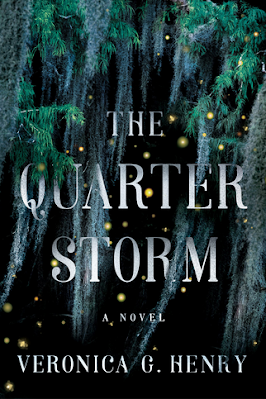Veronica G. Henry, The Quarter Storm (Mambo Reina #1). 47North, 2022. Pp. 287. ISBN 978-1-54203-391-6. $13.49.
Reviewed by Julie Reeser
 Veronica G. Henry is not from New Orleans and does not practice Vodou, but she consulted experts for both, and this careful consideration shines in details and authorial voice in her mystery novel The Quarter Storm. Unlike many past representations of Vodou, Henry focuses on the history and faith, and leaves the fetishization behind. This second book is a departure for Henry from the dark fantasy of an evil carnival, and instead brings characters who could easily be found during a walk through your city, and a murder that feels ripped from the headlines. (I originally assumed this book was self-published due to the surprisingly neutral and forgettable cover for the ebook; 47North turns out to be an imprint of Amazon Publishing, and they offer their acquistions through Kindle Unlimited—which is how I found it—as well as paperback and audio editions.)
Veronica G. Henry is not from New Orleans and does not practice Vodou, but she consulted experts for both, and this careful consideration shines in details and authorial voice in her mystery novel The Quarter Storm. Unlike many past representations of Vodou, Henry focuses on the history and faith, and leaves the fetishization behind. This second book is a departure for Henry from the dark fantasy of an evil carnival, and instead brings characters who could easily be found during a walk through your city, and a murder that feels ripped from the headlines. (I originally assumed this book was self-published due to the surprisingly neutral and forgettable cover for the ebook; 47North turns out to be an imprint of Amazon Publishing, and they offer their acquistions through Kindle Unlimited—which is how I found it—as well as paperback and audio editions.)
Mambo Reina Dumond works from Le Petit Temple, a Vodou business she’s built from the ground up after being trained by her Haitian father. She balances the need to pay her bills with her respect for the powers given to her by her lwa, Erzulie. She makes charms, potions, and poppets for clients, but also listens to their problems and steers them to rely on themselves first.
When a fellow vodouisant priestess is arrested for murder, the local Vodou elite turn their backs on the woman. Mambo Dumond’s faith and sense of justice won’t let her do the same. The police version of events doesn’t add up, and so she sets out to find the real killer and defend her religion. The more people threaten her to stay out of it, the more she can’t let it go. This escalation creates a sense of time running out and deepens the tension. Will she find the answers before the murderer finds her?
This could all be mistaken as a cozy mystery, but the roots of the violence, blooming small flowers of murder, are deeper in nature. New Orleans is a city still reeling from racial trauma, and Henry weaves this truth between her fiction. I felt she pulled her punches with this angle after introducing it, and this weakened her climax. There was a chance to stand tall and shout loud, and Henry leaves it at a whisper.
This imbalance between hard truth and softer desire is repeated in Mambo Dumond’s conflicted relationship with her detective ex-boyfriend. I struggled to find this believable beyond the error of a past fling, and Dumond’s friends and neighbors agree. Henry’s need to make it work conflicts with her own creation of Dumond as a conscientious, boundary-respecting, serious priestess. The detective does not share her faith or her ethics, and this makes me resist the idea of them sharing a bed.
The theme of loss runs like a river throughout the book, its tributaries flooding each scene and every character. Mambo Dumond’s water-based lwa requires her to channel her inner reserves of water to fight and find strength. I loved this interpretation of the faith, and the awareness of the water that so often defines New Orleans. Dumond’s past losses, both of Haiti and of family, carve out her choices. There is also the struggle with sunk costs, large and small, personal and public.
Henry’s writing occasionally lacks musicality at a sentence level, but her characters are her strongest suit, and she plays them deftly. I especially enjoyed the humor of a Black Louisianan who can’t cook, and the friends in her life trying to teach her. At times, Henry’s character-driven writing overshadowed the needs of the plot. There were moments of the mystery that lacked clarity as a result, and Henry’s presence could be felt leaning on the narrative to line things up properly, rather than through the natural behavior of the characters she has lovingly built.
While The Quarter Storm is the first in a series, I do think Henry left a few too many loose threads. There were at least two odd veer-offs, the prologue and a later scene, that felt like uncut darlings. I would rather space be put to use resolving unfinished business. Leaving things unresolved, even side character issues, is a gamble as some readers might feel like a promise was broken rather than seeing this as a hook for the next read.
Overall, I enjoyed the mystery. It held my attention in ways many books haven’t over the last two years, and the sensation of meeting a new community of interesting characters outweighed the flaws for me. There aren’t many fantasy books with older women as the protagonist, and part of the appeal for me was hearing someone closer to my age get to be the heroine. I went into this book knowing very little about Vodou beyond the media’s exaggerated portrayal and came out with a greater respect for the religion and practitioners. If Mambo Reina Dumond can get over her detective, I could easily see her becoming a favorite for fantasy-mystery readers.

No comments:
Post a Comment